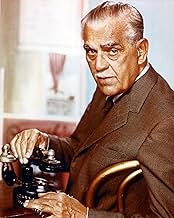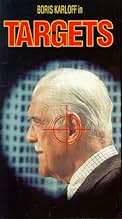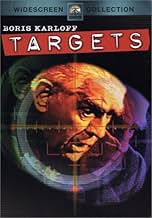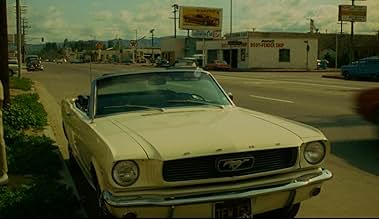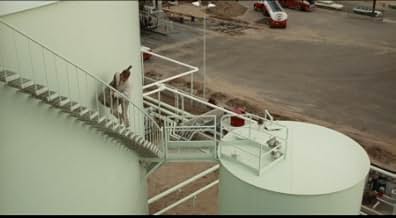Lors d'une apparition dans un cinéma drive-in, une star âgée du cinéma d'horreur affronte un vétéran psychotique de la guerre du Vietnam devenu tireur d'élite meurtrier.Lors d'une apparition dans un cinéma drive-in, une star âgée du cinéma d'horreur affronte un vétéran psychotique de la guerre du Vietnam devenu tireur d'élite meurtrier.Lors d'une apparition dans un cinéma drive-in, une star âgée du cinéma d'horreur affronte un vétéran psychotique de la guerre du Vietnam devenu tireur d'élite meurtrier.
- Réalisation
- Scénario
- Casting principal
- Récompenses
- 1 victoire au total
- Marshall Smith
- (as Monty Landis)
- Waiter
- (as Tim Burns)
Avis à la une
It's also a well kept secret Karloff actually was a pretty good actor! In this movie he definitely gets to show some of his skills and I really enjoyed him in, what later turned out to be, one of his final roles.
But really, it's not a Karloff movie and I also most certainly don't see him as the lead role in this. It's actually best to know as little as possible about this movie, since that way you shall definitely enjoy it most, just as I pretty much did. It's a movie that constantly throws you off. The one moment you think the movie is going to be about one thing but it then later turns out it's being about something totally different and unrelated!
You could see this movie as one that has two simultaneous story lines in it. Both of them are seemingly unrelated to each other but they of course come together toward its end. Not in the most convincing way and it seems a bit random all but I don't know, the randomness of it seemed to sort of suit the movie.
It's because it also has some other very random things going on in it. I'm referring to the sniper, who truly randomly picks his victims and goes on a terrible killing spree. There is something very uncomfortable and horrendous about it and I'm not even kidding when I say that this is one of the most violent movies I have ever seen, purely due to the randomness and pointlessness of all the killings! And I really mean and say this all in a positive way.
It besides all gets shot and buildup in a very effective and also realistic way. Director Peter Bogdanovich certainly did a great job handling its tension and it will put you on the edge of your seat and let you hold your breath for a few seconds.
It's really surprising how great and original this movie is! I say surprising, since this isn't exactly being a movie that is well known anywhere. It makes this a criminal underrated movie, that most definitely deserves to be seen by more!
8/10
http://bobafett1138.blogspot.com/
As usual when it comes to Roger Corman productions, the story behind the film is just as interesting (often more so) as the film itself. Karloff apparently owed Corman a couple of days work, so he was handed to Corman protégé Peter Bogdanovich, and told him to make whatever film he liked - as long as it was cheap, quick, included footage of his film The Terror (1963), and drew on the recent Charles Whitman killings. So, with the help of screenwriter Samuel Fuller, Bogdanovich crafted an intelligent, shocking, and extremely interesting film that what way ahead of its time.
Targets is many things. On one hand it is a warm love-letter to the legendary actors of old. In one scene, Michaels enters Orlock's hotel room, them both being drunk, and watch the end of Howard Hawks' The Criminal Code (1931), which starred a younger Boris Karloff. They briefly discuss the genius of Hawks and Michaels comments on what a fine screen presence Orlock (really Karloff) was, and still is. It is also a first-rate thriller. Tim O'Kelly is very effective as the clean-cut, all-American boy, who is becoming increasingly shaken about the person he finds himself becoming. In real-life, Whitman was found to have an aggressive brain tumour that was believed to be the cause of the sudden killing spree. The violence, though not gratuitous or exploitative, is shocking and nasty. The murder scenes are shot with a slow and detailed precision that are scary given the real-life occurrences.
Most interestingly, the film is a commentary on the generation gap, in both society and in cinema. Michaels states that "all the great films have already been made." Of course, this is not true - America was about to enter its true golden age, when the likes of Martin Scorsese, Steven Spielberg, George Lucas, Dennis Hopper, Francis Ford Coppola, Michael Cimino, and Bogdanovich himself shook Hollywood to its core. But Michaels is reflecting Orlock's fear of the new. Orlock is retiring because "it's a young person's world," and he feels he no longer has his place. The film builds up to the inevitable meeting of Orlock and Thompson - the old vs. the new, if you will.
Targets is quite hard to sum up. It is genuinely a hidden gem, and a true original that should be seen by anyone interested in cinema. Karloff would sadly pass away a year after this film was released, and he gives what is possibly his finest career performance. He has no scary make-up or sets to drown him out. He is simply an old man, walking stick and all. Although he made a couple more films after this, Targets seems his true and fitting exit from cinema. This is close to an 'A'-movie that I've seen a B-movie get, and again proves that Roger Corman was a true cinema genius.
www.the-wrath-of-blog.blogspot.com
You'd think this would be a recipe for a colossal turd of a movie, but on the contrary, it pushed everyone's creativity to the max and resulted in a remarkable work of cinema.
Peter & his wife grabbed their typewriters and wrote a modern horror story contrasted against a classic Victorian horror. Assisted by Peter's friend & successful writer/director Samuel Fuller (not credited), they churned out a profound & poetic script loosely based on the news story of Charles Whitman, a former marine sniper who went on a mass shooting rampage the year before. A bit was also inspired by the Highway 101 sniper shootings in which a 16-year-old boy killed 3 motorists in 1965. That's the "modern horror" part. The Victorian horror comes with the character Byron Orlock (played by Karloff) who is a classic horror icon at the end of his career, realizing that his brand of horror is outdated.
If you can see where this is going, you're in for a great experience. Yes, it's a story of change, out with the old & in with the new, but in a chilling way I've never seen before. The idea that fear has evolved into something far different. Ghost stories & creepy characters no longer cut it. The new brand of terror is faceless, anonymous, soulless and random. Enter the phenomenon of the mass killer.
"Targets" was ahead of its time, and Peter even mentions how its release was delayed because studio execs were afraid of how its message would be received, especially with the assassinations of Martin Luther King Jr and Bobby Kennedy just months prior to release.
It is extremely relevant today, and even if it weren't so artistically done & expertly acted, I would recommend this film for its message alone. The directing, cinematography & acting is icing on the cake, and oh what icing it is! If you're like me, you probably know Boris Karloff as the lumbering creature in "Frankenstein" (1931)... a big, stiff lunk in electricians boots who drags himself around as if he's murderously constipated. Here in "Targets" he is eloquent, charming, tragic, comic and instantly worthy of our attention. My favorite scene is in a hotel room when he tells a ghost story. Director Bogdanovich is very respectful with his camera work in that scene: it opens wide and fixes itself on Karloff with its (and our) undivided attention as it slowly narrows on Karloff's face. No cuts, no jumps, no distractions, just pure Karloff.
The movie is full of thoughtful camera work like that. As you watch the film you get the idea that every camera angle, movement, pan & zoom, and every shadow and inch of background action was very carefully planned to the millimeter. I confess I've never seen a Bodanovich film, but I know he's a very respected director. Now I see why. On a tiny budget that, today, wouldn't cover the catering for a big studio film, he cranked out a magnificent film.
I would put "Targets" squarely in the class of Hitchcock, as compelling as my favorites "Rope", "Rear Window", "Vertigo" and so on. But as I mentioned earlier, it's the blending of Victorian horror (Hitchcock, Vincent Price, etc) with modern horror (Fox News, etc) that makes this an unforgettable show.
Just an epilogue to the story of how the film was made... Although prints caught the attention of major studios, it wasn't officially released until it caught the eye of a film professor who invited Paramount execs to a screening in his classroom. Paramount bought the film for $150,000 (netting Corman a whopping $25,000 profit... hope he didn't blow it all in 1 night!). The film was eventually released, and it received rave reviews from critics but never did well with the public at large. Way ahead of its time. Lucky for us it survived onto DVD 40 years later when perhaps the world will understand it better. Don't hesitate for one minute to see this film if you have the chance!
Le saviez-vous
- AnecdotesRoger Corman told director Peter Bogdanovich that he could make any film that he wanted to, on two conditions: he had to use stock footage from the film L'Halluciné (1963), and he had to hire Boris Karloff for two days (Karloff was under contract to Corman and owed him those two days). Karloff was so impressed with the film's script, however, that he refused any pay for any shooting time over his contracted two days. He worked for a total of five days on it.
- Gaffes(at about one hour and 14 minutes into the film) When Orlok's car pulls up to the drive-in theater's ticket booth, the clock says 9:10. After talking with the two men at the booth for one minute or so, the car pulls away and the clock says 9:00.
- Citations
Byron Orlok: Ladies and gentlemen, boys and girls, I'd like to leave you with a little story to think about as you drive home - through the darkness. Once upon a time, many years ago - there should be a pin spot on my face as I'm talking - once upon a time, many, many years ago, a rich merchant in Baghdad sent his servant to the marketplace to buy provisions. And after a while, the servant came back, white-faced and trembling, and said, "Master, when I was in the marketplace, I was jostled by a woman in the crowd, and I turned to look, and I saw that it was Death that jostled me. And she looked at me and made a threatening gesture. Oh, Master, please, lend me your horse, that I may ride away from this city and escape my fate. I will ride to Samara, and Death will not find me there." So the merchant loaned him the horse, and the servant mounted it and dug his spurs into its flank, and as fast as the horse could gallop, he rode towards Samara. Then the merchant went to the marketplace, and he saw Death standing in the crowd, and he said to her, "Why did you make a threatening gesture to my servant when you saw him this morning?" And Death said, "I made no threatening gesture. That was only a start of surprise. I was astonished to see him here in Baghdad, for I have an appointment with him tonight in Samara."
- Crédits fousThe film's original theatrical prints began with a written title card that read, "Why gun control? Why did a lunatic sniper kill or maim 11 innocent victims in Texas on June 3, 1966? Why were over 7,000 Americans slain or wounded by gunfire in 1967? Why in 1968 after assassinations and thousands of more murders has our country no effective gun control law? This motion picture tells a story that sheds a little light on a very dark and a very deep topic." This title card was added by Paramount Pictures only as a result of the then-recent assassinations of both Doctor Martin Luther King and Senator Robert F. Kennedy, but it was not approved by the film's director, Peter Bogdanovich at all and, as a result of this, it was removed from all later releases of the film, including those for home video.
- Versions alternativesThe film was cut for a "GP" rating only once, mainly for a 1971 re-release of it in order to capitalize on the success of Peter Bogdanovich's then-recent hit film, La dernière séance (1971). Later releases of it on home video were all uncut.
- ConnexionsFeatured in 100 Years of Horror: Boris Karloff (1996)
- Bandes originalesGreen Rocky Road
(uncredited)
Written and performed by The Daily Flash (Don MacAllister, Steve Lalor, Jon Keliehor and Doug Hastings)
Meilleurs choix
- How long is Targets?Alimenté par Alexa
Détails
Box-office
- Budget
- 130 000 $US (estimé)


